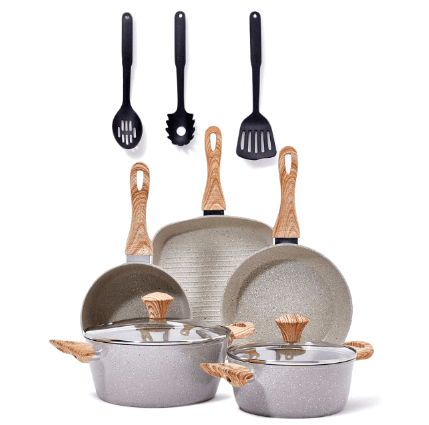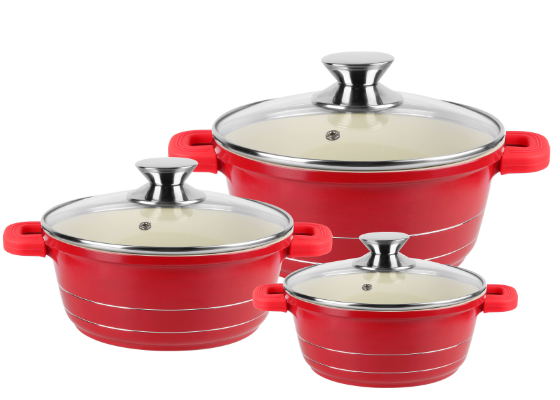Wondering about Aluminum Cookware? Here's an interesting fact…
According to the Cookware Manufacturers Association, aluminum cookware sales accounted for almost 60% of all cookware sold in the USA in 2015.
So basically, more than half of us are using aluminum cookware. Yet we don’t seem to know enough about it. Not a day goes by when I don’t get a query about aluminum cookware or a request to do an in-depth review.
Questions like:
What is anodized aluminum?
What is hard anodized aluminum?
Difference between hard anodized aluminum and non-stick cookware?
And the overriding question: Is aluminum cookware safe?
My goal is to have answers to those questions by the end of this article.

Why use aluminum?
Aluminum is a great conductor of heat which makes it an ideal choice for cookware. Here’s a table so you can see how Aluminum compares to other metals. The thermal conductivity of metals is measured in w/m.k or watts per meter-kelvin. Aluminum has a thermal conductivity that is 16 times that of stainless steel.
What that means for you is that Aluminum will heat up quickly, evenly and 16 times faster than a stainless steel pot!
What is anodized aluminum?
Ok, time for some chemistry 101. If you leave aluminum exposed to the air, it will naturally form a thin layer of aluminum oxide on the surface. While this layer is very thin, it is strong and hard. It prevents the metal from further oxidation by forming a barrier between the aluminum and the air. Scientist call this process ‘passivation’… meaning it makes the metal passive vs reactive.
As a matter of interest, both sapphires and rubies are gems made of aluminum oxide (different colors). Because of its hardness, aluminum oxide is also used as a commercial abrasive.
Now in order to make the layer of aluminum oxide thicker, the metal is subjected to an electrochemical process called anodization. This forms a much thicker layer of the non-reactive aluminum oxide, creating what is known as anodized or hard-anodized aluminum.
Is anodized aluminum the same as hard anodized aluminum?
While both imply a layer of aluminum oxide on the surface of the metal, there is a difference. Hard anodized is, in simple terms, an even thicker layer of aluminum oxide than regular anodized. The resulting metal has twice the strength of stainless steel and is durable, non-reactive and resistant to corrosion and abrasion.
What’s the difference between hard anodized and non-stick?
Hard anodized cookware is made of aluminum that has been anodized to form a hard, durable layer. It may or may not have a non-stick coating on it.

Anodized aluminum was initially developed by Calphalon in 1968 for professional chefs. It was developed in response to the demanding requirements of chefs in professional kitchens. Calphalon Commercial Hard Anodized line was later made available to the public in 1976 so that home cooks could also enjoy this type of cookware. However this product is no longer available and has been replaced with traditional non-stick coated cookware.
Non-stick aluminum cookware is aluminum cookware with a non-stick coating. The non-stick coating can be PTFE based (i.e like Teflon) or Ceramic based. It may or may not be hard anodized aluminum.
Is Aluminum Cookware Safe?
Lightweight aluminum is an excellent heat conductor, but it’s also highly reactive with acidic foods such as tomatoes, vinegar, and citrus. Cooking these in aluminum can alter the food’s flavor and appearance and leave the pan with a pitted surface. In our tests, we detected an unpleasant metallic taste in tomato sauce and lemon curd cooked in aluminum pots.
The amount of aluminum that leaches into food, however, is minimal. In lab tests, tomato sauce that we cooked in an aluminum pot for two hours and then stored in the same pot overnight was found to contain only .0024 milligrams of aluminum per cup. (A single antacid tablet may contain more than 200 milligrams of aluminum.) The consensus in the medical community is that using aluminum cookware poses no health threat.
In short: While untreated aluminum is not unsafe, it should not be used with acidic foods, which may ruin both the food and the cookware. Also note that aluminum cookware that has been anodized (hardened through a process that renders it nonreactive) or clad in a nonreactive material, such as stainless steel or a nonstick coating, does not leach into or react with foods.
If you have more concerns about this, we hope that you can discuss this with us.